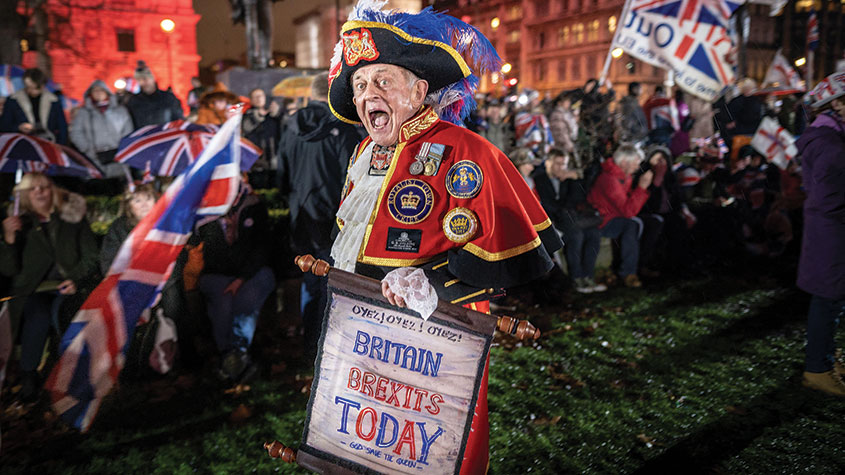The good investments of the 2010s – and the bad
John Stepek takes a look back on which investments did well and which did badly in the decade that’s about to come to an end.

Get the latest financial news, insights and expert analysis from our award-winning MoneyWeek team, to help you understand what really matters when it comes to your finances.
You are now subscribed
Your newsletter sign-up was successful
Want to add more newsletters?

Twice daily
MoneyWeek
Get the latest financial news, insights and expert analysis from our award-winning MoneyWeek team, to help you understand what really matters when it comes to your finances.

Four times a week
Look After My Bills
Sign up to our free money-saving newsletter, filled with the latest news and expert advice to help you find the best tips and deals for managing your bills. Start saving today!

Happy New Decade! Here come the 2020s. What will they hold for investors? We try to go some way to answering that, or at least speculating on the topic, in this special double issue. But it might be more informative to review what investments did well and which did badly in the decade that's about to come to an end.
Any such snapshot is of course flawed. On a rational basis, there's no reason to look back from the end of the year rather than from the middle, or to choose ten years rather than 12 and a half. But as we all know, markets aren't purely rational, humans have a habit of attaching significance to things like dates and if the end of the year isn't a good time to reflect, then I don't know when is.
So what's done well? Handily, a list of top-performing funds and investment trusts for the past decade has just landed in my email inbox from investment platform AJ Bell. Gratifyingly, particularly in light of the endless teasing we get to the effect of "why do you keep going on about Japan?", it turns out that one of our favourite Japanese investment trusts, Baillie Gifford Shin Nippon (LSE: BGS) of which (in the interests of full disclosure) our editor-in-chief, Merryn, is a non-executive director is the third-best performing trust of this decade. If you'd stuck £5,000 in Shin Nippon back then and left it, you'd have more than £40,000 now. So we're glad we kept going on about Japan. For more on why it still looks good, see Steve Russell's and Tim Price's comments in our roundtable. Other top performers include the Lindsell Train trust (we've always liked its sister fund, Finsbury Growth & Income) and various biotech and technology funds.
MoneyWeek
Subscribe to MoneyWeek today and get your first six magazine issues absolutely FREE

Sign up to Money Morning
Don't miss the latest investment and personal finances news, market analysis, plus money-saving tips with our free twice-daily newsletter
Don't miss the latest investment and personal finances news, market analysis, plus money-saving tips with our free twice-daily newsletter
Of course, being a contrarian (I've even written a book on the topic read an excerpt on page 26), I'm more interested in what's done poorly over the past decade. Why? Well, when the market commentators of ten years ago were carrying out their post-mortems on the 2000s, one headline kept cropping up: "The Worst Decade for Stocks Ever". To be pedantic, it was the worst calendar decade (the worst ten-year stretch for US stocks ended in 1938, according to The Atlantic). But the point is, equities followed an extraordinary bad decade with a really very good one, even though, at the end of 2009, very few people were ragingly bullish about anything at all.
Today, the mood is practically the opposite it's hard to find anything that people aren't incredibly bullish about. Hard, but not impossible. It's clear that the losers' list is dominated by one asset class commodities. That's not too surprising. The bull market in resources peaked in 2011 and was followed by a vicious bear market. The bottom for both oil and commodities in general arrived in early 2016. But there's still a lot of catching up to do according to figures from Fidelity, commodities have lost 3.1% a year over the past decade.
Could they be due a rebound? Perhaps. But a decade in which commodities did well would also imply one in which inflation returned and knocked a market that's positioned for perpetually low interest rates. What could trigger that? A seductive economic theory called MMT turn to our Roundtable discussion to find out why it could be the biggest theme of the decade. Meanwhile, from all of us, have a very happy New Year your next issue of MoneyWeek is out on 10 January 2020.
Get the latest financial news, insights and expert analysis from our award-winning MoneyWeek team, to help you understand what really matters when it comes to your finances.

-
 Japanese stocks rise on Takaichi’s snap election landslide
Japanese stocks rise on Takaichi’s snap election landslideJapan’s new prime minister Sanae Takaichi has won a landslide victory in a snap election, prompting optimism that her pro-growth agenda will benefit Japanese stocks
-
 Alphabet 'is planning a 100-year bond': would you back Google for 100 years?
Alphabet 'is planning a 100-year bond': would you back Google for 100 years?Google owner Alphabet is reported to be joining the rare century bond club
-
 What to do as the age of cheap money and overpriced equities ends
What to do as the age of cheap money and overpriced equities endsEditor's letter The age of cheap money, overpriced equities and negative interest rates is over. The great bond bull market is over. All this means you will be losing money, says Merryn Somerset Webb. What can you do to protect yourself?
-
 Investors are bullish – but be very careful
Investors are bullish – but be very carefulEditor's letter Many investors are buying the dip, convinced the latest upswing is the start of a new bull market. The odds are that it’s not, says Andrew Van Sickle. The bear has unfinished business.
-
The MoneyWeek approach to investing
Editor's letter At MoneyWeek, our aim is simple: to give you intelligent and enjoyable commentary on the most important financial stories, and tell you how to profit from them. So how do we do that?
-
 Celebrity bitcoin ads echo the subprime mortgage crisis
Celebrity bitcoin ads echo the subprime mortgage crisisEditor's letter A wave of ads featuring celebrities punting crypto to the masses are reminiscent of how low income Americans were encouraged to take on loans they couldn’t afford, says Merryn Somerset Webb.
-
 Will the UK's property slowdown turn into a house-price crash?
Will the UK's property slowdown turn into a house-price crash?Editor's letter As the cost-of-living crisis intensifies and interest rate rise, it is hard to see reasons for UK house prices to keep rising, says Merryn Somerset Webb.
-
 The unintended consequences of ESG investing
The unintended consequences of ESG investingEditor's letter Many people are refusing to invest in energy companies, citing "ESG" concerns. But we still need fossil fuels, says Merryn Somerset Webb, and will for years to come. Boycotting the sector is a bad idea.
-
 What sardines can teach investors about today's markets
What sardines can teach investors about today's marketsEditor's letter A California tale of “eating sardines” and “trading sardines” can help us divide investments into speculative and real, says Merryn Somerset Webb. Something that's very useful when looking at today’s markets.
-
 The market finally seems to be getting it
The market finally seems to be getting itEditor's letter Reality checks are coming fast to the markets, says Merryn Somerset Webb – with even 2022’s safe havens beginning to reflect recession worries.